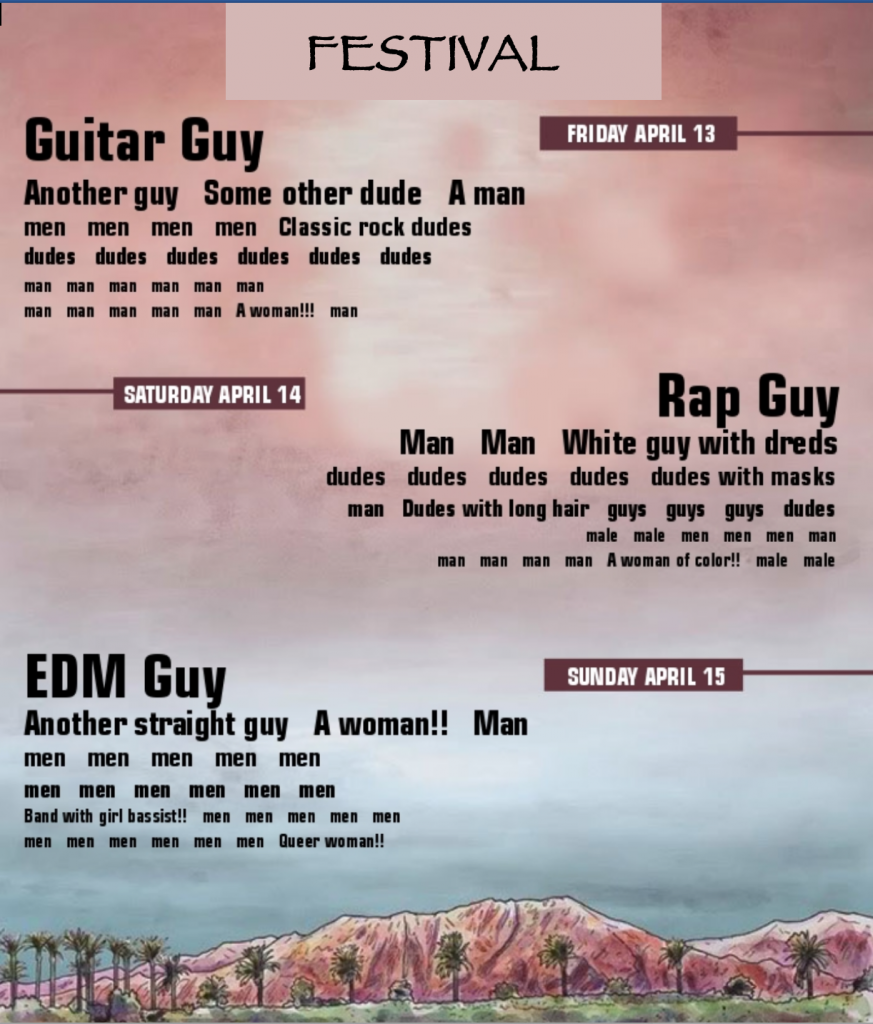By Ali Bush
As we all hover patiently over our phones to see if our favorite bands make this year’s lineups, do we have diversity and inclusion in mind? Festivals have become numerous and omnipresent on social media, and they seem to have become a staple of summer activities. A slew of new festivals has popped up over the past few years (who can forget the glory of Fyre Festival?). With constantly new expansion plans and rising prices, music festivals are high in demand and have become a kind of musical tourism for wealthy millennials. While music festivals offer exposure for musicians and stimulate local economies, they continue to exclude women, women of color, queer folks and a slew of other musician from their lineups.
Even though music festivals are reaching massive success, they are always sure to provide a stage for questionable ethics. From Coachella’s founder supporting homophobic organizations, to the unexplainable trend of wearing culturally appropriative garb to festivals, there are countless things we could all commiserate about when it comes to the growth of massive music festivals. The most flagrantly unjust issue, in my opinion, is the lack of female musicians in these festivals’ lineups.
Even though over 50% of attendees of music festivals are women, a 2017 Pitchfork article reports that festival bookings are egregiously male. Of the 996 artists and bands performing at 2017 festivals, 12% were mixed gender ands, and only 14% of those acts are female. Although the gender gap has decreased in the past 5 years, particularly at EDM festivals where female DJs are on the rise, the gaps that exist now are too glaring to ignore.
This year, despite some progress, lineups continue to be male dominated. According to Vice News, Wireless festival is blatantly dude-oriented this year, having only 3 women acts among 40 performers. Popstar songwriter, Halsey went so far as to complain on twitter about the lack of women headliners in Firefly’s lineup. She pointed out a crucial point in this systematic problem: festival booking agents invite acts to play. Thus, the problem lies in who is running these festivals and who don’t invite to play. The only way to end make lineups more inclusive is to actively seek out and promote female musicians on a greater scale.
A Slate Magazine article from 2013 points out that these festivals remain male-dominated because preceding festivals like Bonnaroo and Lollapalooza have sprung from the indie rock community which is historically male-dominated. Thus, networks of musicians, promoters, and crew arise from generally all-male communities. In a contemporary sense, this is no excuse, as women are represented in every genre today.
Sticking with a male-dominated lineup is not only appallingly unjust for female musicians, but these exclusive lineups create a vicious circle. Festivals are a crucial way for musicians to gain exposure and reach new audiences, and if women, women of color, non-binary conforming folks, and queer folks aren’t represented in festival lineups, they miss out on major opportunities to advance their careers. This further keeps them invisible, silent, and underrepresented at festivals and, more importantly, in the entire music industry.
Despite these saddening truths about music festivals, there is comfort in the fact change is possible due to the fact that women are becoming more active behind the scenes at festivals. Although they’re not onstage, women are beginning to take positions in which they can gain control over lineups and provide support to the few female musicians at these festivals. A recent Nylon story provides the inspiring examples of Glastonbury’s co-organizer Emily Eavis and Air + Style’s general manager Molly Scott. These women work within a male-dominated industry not only to simply get the respect they deserve, but to reach true gender and racial inclusivity within the festival scene.
There is some hope in this year’s lineups as well. Coachella’s infamously male-dominated lineup features a record number of female performers this year, and features many kinds of diversity this year, inviting women from Beyoncé to Dolly Parton.
Festivals are no longer dismissible events for wealthy young folks, but a force within the music industry that needs to be kept accountable. They are reflections of the patriarchal music industry, and are an entry point to advocate for more wider representation and true inclusivity in all forms of music. Festival organizers need to not only advocate for and hire a diverse field of musicians, but they also need to realize that representing female musicians inspires young women and proves women’s place in music.



